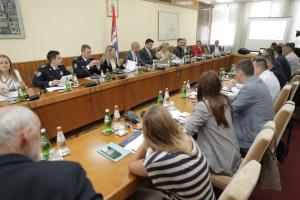
Bosnia and Herzegovina and Serbia are in the process of adopting road safety strategies and actions plans that rely on modern tools. In both countries, road safety audit and road safety inspection are recognized by legislation, but in-depth analysis of road crashes is still not part of the legislation.
To address this situation, project entitled “Better Road Safety System based on in-depth analysis of road accidents in Bosnia and Herzegovina and Serbia” has recently kicked off in Belgrade, Serbia, and aims to build a better road safety system based on results of in-depth analysis of road crashes.
Financed by the UN Road Safety Fund, the project is implemented by UNECE and the World Health Organization. It is one of 44 high-impact projects financed by the UN Road Safety Fund, which guides government action towards achieving SDG 3.6: halving deaths on the road. At the national level, it will be implemented by the Ministry of Communication and Transport of Bosnia and Herzegovina and the Road Traffic Safety Agency of Serbia, as well as relevant ministries and road safety stakeholders.
Attended by representatives of UNECE, World Health Organization, UN Country Team in Serbia and all relevant road safety institutions of Bosnia and Herzegovina and Serbia, the kick-off meeting aimed to strengthen the knowledge of national road safety stakeholders about the project’s objectives and timeline, exchange information between national, regional and international stakeholders, and provide understanding of the benefits and potential risks of implementation.
In-depth analysis of road crashes is a tool that can help to objectively analyse road crashes and later contribute to the improvement of the road safety system. It can also provide detailed knowledge on the mechanism of occurrence of a road crash, as well as its entire progression and consequences, especially focusing on finding the primary causes of its origin, considering the human factor, vehicle, road, and environment.
“The primary aim of the project is to bridge the gap in the current road safety legislation and strategies by introducing in-depth analysis as a proactive tool for improving road safety,” explained UNECE Regional Adviser Nenad Nikolic. “The project facilitates a deeper understanding of the causes of road crashes, allowing for targeted interventions that align with broader national safety goals. It also furthers the importance of UN road safety conventions in building national frameworks that prevent death and injuries from road traffic crashes.”
The ultimate goal is to trigger improvements in all pillars of the road safety system. Project activities are focused on legislation, education, and technology, which ensures a high degree of continuation of project activities when the project is completed and are in line with the priorities of the UN Global Plan of Action for Road Safety 2021-30 and the Recommendations for Enhancing National Road Safety Systems of UNECE’s Inland Transport Committee (“ITC Recommendations”).
“Serbia and Bosnia and Herzegovina are making progress in improving road safety. Both countries have developed strategies aligned with international frameworks, yet there is still much work to be done,” noted Françoise Jacob, UN Resident Coordinator in Serbia. “Road traffic crashes continue to claim too many lives out of which 50% are pedestrians, cyclists and moto bikers. We must accelerate our efforts to prevent traffic accidents. By adopting a comprehensive approach, adjusting the legislative and policy framework, enforcing road traffic laws systematically, reducing speed, investing in and improving infrastructure, resuming education and awareness campaigns and protecting vulnerable road users, we can create safer and more inclusive transport systems. We must also pay a particular attention to how we shape our urban areas and transform urban mobility, since the largest numbers of accidents take place within cities. Together, we can make significant progress towards the road safety targets of the Sustainable Development Goals and ensure a brighter, safer future for all.”

